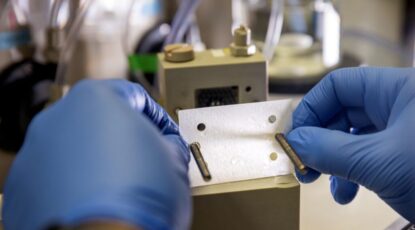Research News
-
Wildfires, windstorms and heatwaves: How extreme weather threatens nature’s essential services
How much will strawberry harvests shrink when extreme heat harms pollinators? How much will timber production decline when windstorms flatten forests? These are some critical questions that a new computer simulation, developed by U-M researchers, is helping answer.
-
Polio vaccine milestone: Podcast marks 70th anniversary of historic announcement at U-M
In today’s challenging era for vaccines, the U-M School of Public Health hosted a podcast taping April 11 in recognition of Dr. Thomas Francis Jr.’s announcement that the polio vaccine was safe and effective. U-M epidemiologist Matthew Boulton and Michigan’s chief medical executive Natasha Bagdasarian discuss vaccines, then and now.
-
Navigating the fear of DeepSeek and China’s technological advancements
In recent years, China’s technological advancements have captured the world’s attention, with DeepSeek — a Chinese AI model — emerging as a focal point of both admiration and anxiety. This duality reflects a deeper tension in how the U.S. perceives technological progress from China, revealing complex layers of fear, competition, and reflection.
-
U-M federal research funding fuels innovation, economic growth
Research universities are not only engines of discovery — they’re also engines of economic vitality. Every federal dollar invested in U-M research generates ripple effects across the country, creating jobs, supporting businesses, and preparing the skilled workforce the nation needs to stay competitive.
-
Federal budget cuts and worker safety
Cuts to the National Institute for Occupational Safety and Health has workplace safety experts such as U-M’s Richard Neitzel concerned that “without this research, more Americans will suffer preventable injuries and illnesses, businesses will face higher costs, and families will lose loved ones to workplace accidents that could have been prevented.”
-
Enabling stroke victims to ‘speak’: $19M toward brain implants to be built at U-M
Marcus Foundation’s $30 million gift supports a collaboration between Stanford and U-M to help stroke victims regain the ability to read, write and speak. The scientists are using the world’s smallest computers linked up to the world’s most biocompatible sensors.
-
Making desalination more eco-friendly: New membranes could help eliminate brine waste
Desalination plants, a major and growing source of freshwater in dry regions, could produce less harmful waste using electricity and new membranes made at the University of Michigan.
-
Why a next-gen semiconductor doesn’t fall to pieces
A new class of semiconductors that can store information in electric fields could enable computers that run on less power, sensors with quantum precision, and the conversion of signals between electrical, optical and acoustic forms. But how they maintained two opposite electric polarizations in the same material was a mystery. Until now.
-
COVID-19, 5 years on: Lingering impacts and pandemic preparedness
March 11 marked five years since the World Health Organization declared COVID-19 a global pandemic. U-M experts look back on successes and failures in public health and medicine; discuss continued effects in education, business and society; and offer insights on how prepared we are for a future pandemic.









